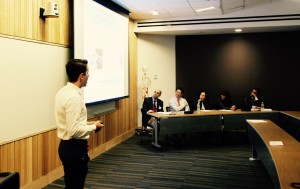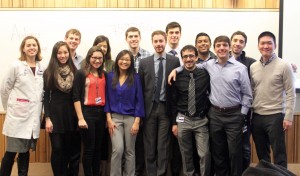by Dr. Harry Cho
As we ring in the New Year, the medical students in our new Student High Value Care Committee (sHVC) have three wishes. They spent quite a bit of time doing research, reviewing evidence and guidelines like Choosing Wisely and our own, Things We Do For No Reason.

The Student High Value Care Pitch Day.
The amazing thing about students is that they haven’t yet conformed to our standards of medicine. They are learning more about what could be, and not what is. An air of innocence surrounds them, as they attend lectures, read textbooks and examine literature with the purest of intentions. If anything doesn’t make sense, they speak out with honesty.
So in the spirit of #ThingsWeDoForNoReason, they showcased their honesty with these three wishes in front of our faculty, staff, and fellow classmates during our sHVC “Pitch Day” at Icahn School of Medicine at Mount Sinai. They wanted to do better to decrease overuse in our hospital.
Stop checking folate levels.
According to a recent study it’s 0.1% likely to be low. After listening to Atul Gawande explain the difference between low value and no value, this test is as close to no value as you can get. Ever since 1998 and the mandatory folate fortification of foods in US, the incidence of folate deficiency has dwindled, but the amount of folate testing has gone up and up. Yet, we keep at it like it’s the root cause of all anemia, delirium and dementia. Eat a bowl of Cheerios, they recommended – that’s high value folate goodness.
Quit the “daily” leeching.
Who came up with this concept of “daily” labs anyways? We don’t have “daily” echocardiograms, or “daily” head CTs. Why are we continuing this antiquated culture of this daily leeching on our poor hospitalized patients? “Hey Mr. Jones, sorry to wake you at 5AM… let me to stick you with a needle while you are physically and mentally exhausted, because I forgot to spend a moment at the end of yesterday to think twice about whether you needed it.” Labs are used to aid in diagnosis, not prophylaxis. There are no universal guidelines to say checking daily CBC and BMP prevents disease in a hospital, but we conform to this madness like it’s a miracle vaccine that prevents hospital-acquired infections. All the while, we induce anemia (surprise!), leading to a high-risk transfusion and yet another anemia workup, including that beloved folate level.
Stress not about the prophylactic PPI.
PPI for the purpose of stress prophylaxis comes from ICU literature, not from studies based on the great majority of the other beds hospitalists cover. We don’t extrapolate inpatient management guidelines to the outpatient world (e.g. early goal directed therapy for a URI) so why are we using ICU evidence for the rest of the inpatient world? We once thought it was relatively harmless to keep the PPI on, but now we are increasingly aware of the dangers: the risk of aspiration pneumonia and that dreaded c. difficile. Who hasn’t seen a case of those last week?
These aren’t pie in the sky dreams of world peace or eliminating hunger. Nor are they half-hearted resolutions that fail so easily, like not eating chocolate or going to the gym every morning. These are their high-value resolutions, not just wishes, and our students are putting in a lot of work using their QI training to make these changes practical, strategic, and sustainable.
 It’s going to be quite a ride. Looking back to the beginning, it was the act of just one medical student, Sonya Makhni, at the Icahn School of Medicine at Mount Sinai who sent an email asking her classmates who would be up for improving value and costs of care in our hospital. It was met with an eager reply from over 20 students. Between the sHVC and our “faculty” High Value Care Committee, we now have a small army to bring down the wall of overuse at Mount Sinai Hospital.
It’s going to be quite a ride. Looking back to the beginning, it was the act of just one medical student, Sonya Makhni, at the Icahn School of Medicine at Mount Sinai who sent an email asking her classmates who would be up for improving value and costs of care in our hospital. It was met with an eager reply from over 20 students. Between the sHVC and our “faculty” High Value Care Committee, we now have a small army to bring down the wall of overuse at Mount Sinai Hospital.
To help pave the long road ahead, Dr. Celine Goetz and I are building a Student Value Improvement Curriculum with the Student Co-Chairs, John Di Capua and Irene Lee. We’re pairing up each of the student teams with hospitalist faculty mentors, and providing institutional and data support to help push this student-led journey forward.
With the costs of healthcare rising rapidly, we’ve spent the past few years trying to answer the question, “How do we teach our students about value?” I believe our medical students are the brightest in the world, and teaching value is achievable. However, the bigger question on our minds is, “How can we get students to implement high value care in a real setting?” We’re all excited here, and the New Year will tell.



Testing the comments feature. Does it go to moderation?